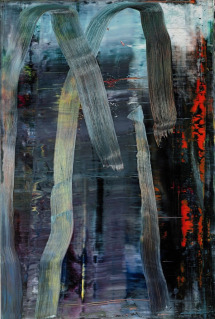When I arrived to take a place as a judge for the Walter Naumburg International Violin Competition I was welcomed by several violinists who were judging the competition. My friend Jorja Fleezanis was there. Sylvia Rosenberg was very cordial, so was Anahid Ajemian, and later Kyung-Wha Chung (who joined the committee for the competition’s final round).
 On my arrival, another venerable jury member, something of a violin guru, asked: “Who are you?” “I’m Bruce Brubaker,” said I. “He’s the pianist,” Sylvia added generously. “Never heard of ya,” said the guru.
On my arrival, another venerable jury member, something of a violin guru, asked: “Who are you?” “I’m Bruce Brubaker,” said I. “He’s the pianist,” Sylvia added generously. “Never heard of ya,” said the guru.
She made a point: wouldn’t we want expert violinists and violin teachers judging a major violin competition? When Robert Mann invited me, such thoughts crossed my mind: I can’t play the violin, or even hold the instrument. I’ve never played Brahms’s Concerto … or even Suzuki, Book 1!
In our world of intense and narrow specialization, real danger comes when our experts, highly trained and aware of the minutiae of their particular discipline, only see or hear endless details and subtleties. Can it be sometimes they can’t see the forest for the trees?
We rely on experts to know more than we do. That’s not an excuse to stop paying attention. Let’s not abdicate our responsibility to try to follow along.
During two weeks when the preeminent violist Kim Kashkashian was away from New England Conservatory, I “taught” her weekly Boston master class. Here was a roomful of exceptional viola virtuosos. One player gave an accomplished reading of a sonata by Hindemith. In the first line of the music, I was bothered by a phrase-group that was broken up by what seemed to me to be an awkward fingering. After a complete play-through of the sonata, I asked the violist to reconsider the beginning. He was making a big shift right where Hindemith notated a smooth legato slur. Surrounded by experts, I asked them: “Is there some other fingering that might connect this better.” Someone almost shouted out: “You could just play it in first position.” The performer tried, and wow! The phrase connected together, just as I believe it’s represented in Hindemith’s notation.
A few days later, I got an only slightly aghast message from Kim. “I understand you’re giving my students fingerings now!” she said.

Thanks for sharing this. I love classical stringed instruments (but this applies to so many other areas of life). My son is 6 and has a great interest in music, especially violin. A friend gave him a nice one for Christmas and he wants to learn. I play some guitar, but no violin. The only thing I do is try to encourage him to get a feel and tone quality. There are teachers around, but how do I know the good from the bad? How do I find one who will invest in my sons musical journey?
Chicken Pens
Just wondering … why’d you agree to judge a violin competition in the first place?
I like working with musicians and artists who don’t do just what I do. I enjoyed coaching string players at Juilliard, and even dancers. The Naumburg Violin Competition really focused on musical values, and in the end there were no great disagreements among the jurors.